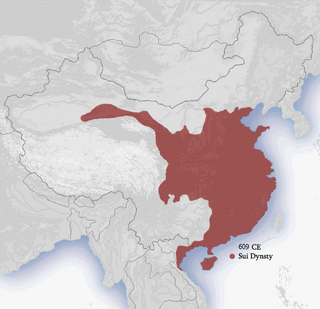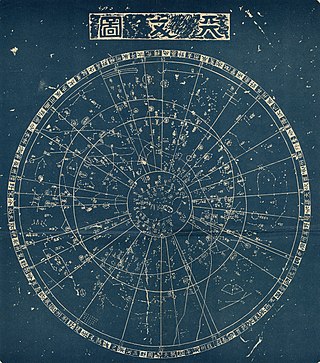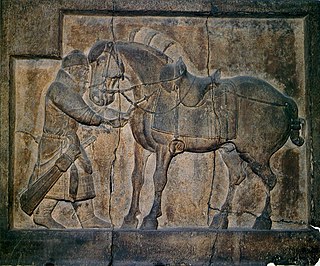
The Tang dynasty, or Tang Empire, was an imperial dynasty of China that ruled from 618 to 907, with an interregnum between 690 and 705. It was preceded by the Sui dynasty and followed by the Five Dynasties and Ten Kingdoms period. Historians generally regard the Tang as a high point in Chinese civilization, and a golden age of cosmopolitan culture. Tang territory, acquired through the military campaigns of its early rulers, rivaled that of the Han dynasty.

The Sui dynasty was a short-lived imperial dynasty of China that lasted from 581 to 618. The Sui unified the Northern and Southern dynasties, thus ending the long period of division following the fall of the Western Jin dynasty, and laying the foundations for the much longer lasting Tang dynasty.

劉 / 刘 is an East Asian surname. pinyin: Liú in Mandarin Chinese, Lau4 in Cantonese. It is the family name of the Han dynasty emperors. The character 劉 originally meant 'kill', but is now used only as a surname. It is listed 252nd in the classic text Hundred Family Surnames. Today, it is the 4th most common surname in Mainland China as well as one of the most common surnames in the world.

Huangdi, translated into English as Emperor, was the superlative title held by monarchs of China who ruled various imperial regimes in Chinese history. In traditional Chinese political theory, the emperor was considered the Son of Heaven and the autocrat of all under Heaven. Under the Han dynasty, Confucianism replaced Legalism as the official political theory and succession in most cases theoretically followed agnatic primogeniture. The lineage of emperors descended from a paternal family line constituted a dynasty.

Traditional Chinese astronomy has a system of dividing the celestial sphere into asterisms or constellations, known as "officials".
Dynasties in Chinese history, or Chinese dynasties, were hereditary monarchical regimes that ruled over China during much of its history. From the legendary inauguration of dynastic rule by Yu the Great circa 2070 BC to the abdication of the Xuantong Emperor on 12 February 1912 in the wake of the Xinhai Revolution, China was ruled by a series of successive dynasties. Dynasties of China were not limited to those established by ethnic Han—the dominant Chinese ethnic group—and its predecessor, the Huaxia tribal confederation, but also included those founded by non-Han peoples.

Xue is the pinyin romanization of the Chinese surname 薛 (Xuē). It is romanized as Hsüeh in Wade-Giles. In Hong Kong and Macau it is usually romanized through its Cantonese pronunciation Sit. In Korean, it corresponds to Seol (설), in Japanese to Setsu and in Vietnamese to Tiết. in Indonesia and Netherlands, it is commonly spelled as Siek. According to the 2010 Chinese Census, it is the 76th most common surname in China, a sharp decline from 48th in 1982. In a study by geneticist Yuan Yida on the distribution of Chinese surnames, people who carry the name Xue are dispersed throughout the country and is most heavily concentrated in Shanxi. It is the 68th name on the Hundred Family Surnames poem.

Yan Liben, formally Baron Wenzhen of Boling (博陵文貞男), was a Chinese architect, painter, and politician during the early Tang dynasty. His most famous work, possibly the only genuine survival, is the Thirteen Emperors Scroll. He also painted the Portraits at Lingyan Pavilion, under Emperor Taizong of Tang, commissioned in 643 to commemorate 24 of the greatest contributors to Emperor Taizong's reign, as well as 18 portraits commemorating the 18 great scholars who served Emperor Taizong when he was the Prince of Qin. Yan's paintings included painted portraits of various Chinese emperors from the Han dynasty up until the Sui dynasty (581–618) period. His works were highly regarded by the Tang writers Zhu Jingxuan and Zhang Yanyuan, who noted his paintings were "works among the glories of all times".
The Old Book of Tang, or simply the Book of Tang, is the first classic historical work about the Tang dynasty, comprising 200 chapters, and is one of the Twenty-Four Histories. Originally compiled during the Five Dynasties and Ten Kingdoms period, it was superseded by the New Book of Tang which was compiled in the Song dynasty, but later regained acceptance.

Myōken, also known as Sonjō-Ō, is a Buddhist deification of the North Star worshiped mainly in the Shingon, Tendai and Nichiren schools of Japanese Buddhism.

Li or Lee is a common Chinese-language surname, it is the 4th name listed in the famous Hundred Family Surnames. Li is one of the most common surnames in Asia, shared by 92.76 million people in China, and more than 100 million in Asia. It is the second-most common surname in China as of 2018, the second-most common surname in Hong Kong, and the 5th most common surname in Taiwan, where it is usually romanized as "Lee". The surname is pronounced as in Cantonese, Lí (poj) in Taiwanese Hokkien, but is often spelled as "Lee" in Hong Kong, Macau, Taiwan and many overseas Chinese communities. In Macau, it is also spelled as "Lei". In Indonesia it is commonly spelled as "Lie". The common Korean surname, "Lee", and the Vietnamese surname, "Lý", are both derived from Li and written with the same Chinese character (李). The character also means "plum" or "plum tree".
Bugang is a Daoist ritual dance or walk, based upon the Yubu "Steps of Yu" tradition, in which a Taoist priest paces through a supernatural pattern, such as stars in the Big Dipper or numbers in the Loshu magic square. Texts from the Shangqing School revelations contain the earliest descriptions of bugang, frequently with the practitioner pacing among constellations, especially the Big Dipper's stars. When religious Daoism began during the Six Dynasties period, the expression bugang tadou 步罡踏斗 "pacing the guideline and treading on the Dipper" became popular.

Dou is the Mandarin pinyin romanization of the Chinese surname written 窦 in simplified Chinese and 竇 in traditional Chinese. It is romanized Tou in Wade–Giles. Dou is listed 39th in the Song dynasty classic text Hundred Family Surnames. As of 2008, it is the 219th most common surname in China, shared by 380,000 people.
Niu is a Chinese family name was listed 310th on the Song Dynasty list of the Hundred Family Surnames. It means "ox". According to a 2013 study it was the 103rd most common surname at the time, shared by 2.20 million people, or 0.150% of the total population, with the province with the most being Henan.

Chinese theology, which comes in different interpretations according to the classic texts and the common religion, and specifically Confucian, Taoist, and other philosophical formulations, is fundamentally monistic, that is to say it sees the world and the gods of its phenomena as an organic whole, or cosmos, which continuously emerges from a simple principle. This is expressed by the concept that "all things have one and the same principle". This principle is commonly referred to as Tiān 天, a concept generally translated as "Heaven", referring to the northern culmen and starry vault of the skies and its natural laws which regulate earthly phenomena and generate beings as their progenitors. Ancestors are therefore regarded as the equivalent of Heaven within human society, and therefore as the means connecting back to Heaven which is the "utmost ancestral father". Chinese theology may be also called Tiānxué 天學, a term already in use in the 17th and 18th centuries.
[In contrast to the God of Western religions who is above the space and time] the God of Fuxi, Xuanyuan, and Wang Yangming is under in our space and time. ... To Chinese thought, ancestor is creator.

The Great Emperor of the Curved Array, also called the Gouchen Emperor and Tianhuang Emperor, is one of the highest sky deities of Taoism. He is one of the Four Sovereigns and is in charge of heaven, earth, and human and of wars in the human world.
Tianhuang Emperor is an ancient Chinese constellation, located in the Purple Forbidden enclosure, surrounded by the Gouchen, is one of the symbols of the emperor in astrology . Although the present-day Polaris is located at the tip of the handle of a ladle, around 1100 B.C. the north pole distance of Beta Ursa Minoris was about 6.5 degrees and was the closest Pole Star to the North Pole of the heavens and was called Emperor.











